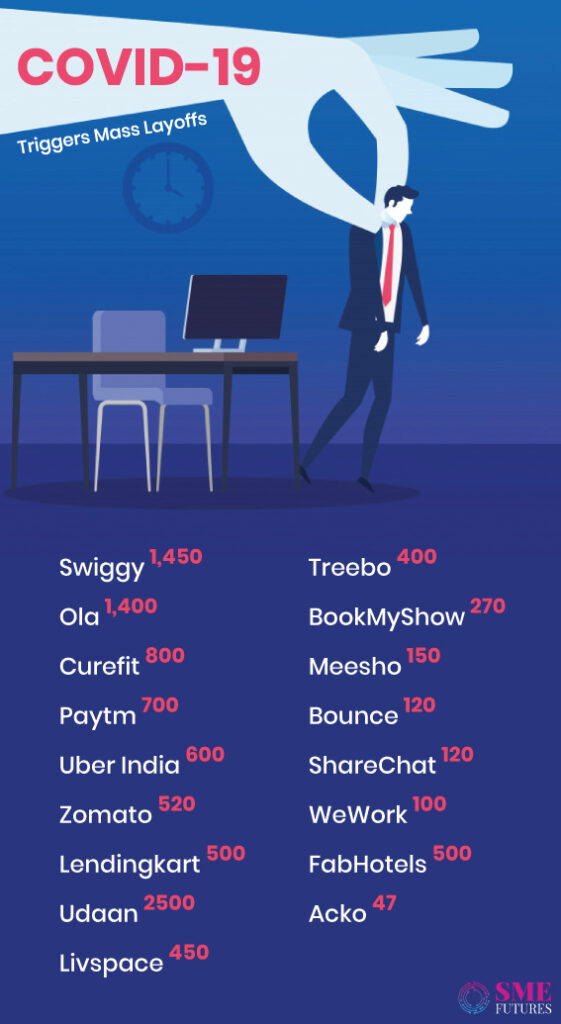Not very long ago, Indian startups were poster child of emerging entrepreneurial landscape in India. But, then wrath of COVID-19 wrecked havoc on them. Numerous startups sunk while some of them survived by modifying themselves according to customer requirements during the times of pandemic.
Most of the startups are surviving on meagre revenues as their operations and further output have dried up. As a result, thousands of employees across various sectors were retrenched since mid-March. According to a combined survey of FICCI and Indian Angel Network (IAN) on 250 Indian startups, nearly 18 per cent of Indian startups laid off their staff and 12 per cent of them closed their shutters.
The wave of startup layoffs not only made an impact on early stage startups, but also made a deep impact on unicorns, prospective unicorns, and most recently funded companies. Layoffs.fyi, a tech startup that tracks job cuts globally, states that the laying off of employees was at its peak from March to April and in first weeks of May.
Ola witnessed around 95 per cent revenue decline and laid off 1,400 employees. Swiggy also retrenched 1,100 people in May and 350 people in July. Uber accounted for layoff of 600 employees in India that made 6700 layoffs globally. Bengaluru based LivSpace let go off 450 employees and MakeMyTrip laid off 350 people. Some other prominent names included Zomato, BookMyShow, Curefit, Clevertap, Fabhotels etc.
COVID-19 Heightened Unemployment Rate
As MSMEs and startups became the epicentre of crisis, unemployment rose in India. Centre for Monitoring Indian Economy (CMIE) reported that overall unemployment rate rose from 8.75 per cent in March to 10.99 per cent in June.
Furthermore, a report by Global Consultants states that India is set to lose 130 million jobs. So far, startup employees are on edge for job loss after blue collared workers.
According to Dilip Chenoy, Secretary General, FICCI, the entire start-up sector gasps for breath right now. He reclaims, “The investment sentiment is also subdued and is expected to remain similar in coming months. Lack of working capital and cash flows may lead to major layoffs by start-ups during next 3 to 6 months.”

Layoff As a Survival Technique
Majority of startup founders or co-founders do not specialize in recruitment unless it is a HR startup. Hence, a bad hire is a costly mistake for them. For instance, a restaurant that began few months back had to shut down and the chef, waiter, and cleaner, all had to lose their jobs. The impact is therefore huge for all stakeholders.
Dr. Saurav Das, Co-founder, Zetta Women & Soul’s Connect says, “We need to look at every facet of a situation that spur a firing decision, especially at times like this when economies of most of the countries are not doing well, businesses are closing, people are losing jobs, spending capacity is down, and things are extremely expensive all across.”
Job security was never a strong USP of startups. An IBM Institute report states that 90 per cent of startups tend to fail within first five years. Most of the industry experts believe that layoffs were expected as the common method for business continuity under these circumstances is cost optimisation which leads to layoffs.
Since pandemic outbreak there is a significant drop in investment scenario. This is further pushing startups to cut some costs. The industry tracker Tracxn tells that funding is on decline by 29 per cent since the beginning of 2020. It registered $4.2 billion as compared to figure of previous years which was $5.9 billion. Deepanshu Khandelwal, CEO at Catalyst Atal Incubation Centre said that though the impact of this frenzy on startups is heterogeneous, cash conservation still remains a priority for all.
He opines, “In general, most startups are dependent on external capital from investors (angels/PE/VC) for the acceleration of growth. Long periods of non-functional months during lockdowns have reduced their runway. As a result, startups moved into a cash conserving mode eventually leading to rapid layoffs, furloughs and massive salary cuts to increase their business runways.
Preventing layoffs primarily depend on an effective revenue model. Dr. Das advices, “Sales is the backbone of any organisation and it is vital for any startup. If the revenue is not generated by new resources in some form or the other, salaries are not on time. Therefore, firing on some pretext becomes inevitable for founders or co-founders. In such cases, designations do not matter.”
In the similar vein, Akbar Khan, CEO at CreditEnable India, a tech and credit insights firm feels that the pandemic has created varying degrees of uncertainty across various businesses and startups are no exception. Observing the trend he says, “Startups are more vulnerable than established corporates because they receive funding on basis of achieving milestones. Therefore, cost reduction becomes a requirement for survival. Although, layoffs are last resolve for all good start-ups.”
Aditya Narayan Mishra, Director and CEO, CIEL HR Services is also of same opinion. He tells, “Products of start-ups and their services are under great pressure. While there is no consumer demand, they are not making any revenue. In addition, these startups run on venture capital funds which are not available for most. Hence, they are opting for layoff of workers to optimise.”
Looking at the layoffs at large, Business Coach and entrepreneur, Prateek Agarwal feels that lay off of people has been a survival technique for most of the startups as they dwell to disrupt the market and growth. He adds, “Startups live on fundings from investors. They are cut-throat in competition for disrupting the market and hiring and firing is a regular trend for them.”
Syed Farhan, Founder at OnBenchmark.com, a job site for on bench people says, “Often startups do not have a secure and concrete revenue model which implies that they do not have a permanent cash flow. Further, the impact of COVID-19 as a macro-environmental factor is beyond the control of anyone. In such circumstances, debacles such as layoffs are bound to happen as companies are in huge loss.”
In addition to this, startups are advocating the layoff situation as rightsizing. According to them, this ensures the availability of minimal necessary human resources and cost cutting can then be implemented elsewhere whenever there is a scope for it.
Other Facets of Layoffs
As companies try to stay afloat with dwindling margins and profitability, the stress and layoffs take a toll on employees who become a part of this drive. A survey by Naukri.com has revealed that at least 1 in 10 Indian jobseekers have confirmed that they have been laid-off and nearly three in 10 jobseekers fear an imminent layoff.
Talking about how layoffs has impacted the mindset of employees, Sumit Mittal, founder at VentAllOut, a social media platform where people can vent their thoughts anonymously says, “It has undeniably impacted the morale of not just startup employees but everyone.”
People are obviously apprehensive of jobs losses and salary cuts. According to the Naukri survey, 70 per cent of jobseekers are looking out for new jobs for better career opportunities. This comprises of 16 per cent individuals that are encountering salary cuts by their organisation and 14 per cent people which are searching jobs due to the fear of being laid off by their company.
Neel Katarnavare, Director of Retainer Business at Monk Entertainment is also of the same opinion witnessing the wrath of pandemic everywhere. He confesses, “Lockdown has taken a toll on everyone’s mental health and hence being patient should be the motive of every organisation. I believe we all could use a higher sense of empathy during these times.”
He thereafter suggests that contrary to the quick hire and fire policies that most of the startups follow, the candidate should be allowed to settle in the environment of the new job and should be given enough opportunities to prove their credibility.
On the other hand, Sumit Mittal emphasizes on honing our existing skills leading to self-development. Mittal says, “We must all be ready to face the unpredictable in our lives. If you don’t adapt to change, the changes such as economic depression or a biomedical eventuality like this will affect you badly.”
Alternate Opportunities for Laid off Employees
Most of the low-skilled positions are doing replacement hiring these days and demand of white-collar space has also increased. Some of the sectors that are seeking a spike are home healthcare and online education. Furthermore, sites such as Monster.com, Naukri.com, and Indeed have launched dedicated webpages for laid off people.
Naukri has recently launched a microsite within step-up initiative. Linkedin is also posting open jobs postings for such people. Monday Joining is another job portal that only allows people to register for free who can join an organization within 14 days.
Amit Khanduja, Founder of Monday Joining tells us that his platform is relevant for people who unfortunately lost their jobs during the pandemic. He claims, “We are encouraging recruiters to pick people who desperately need job in these tough times. The platform is not for people who wish to switch or who already are in jobs.”
He further adds, “Numerous startups are hiring from our platform. White collars jobs within IT, marketing, consulting, service industry and even for freshers are available.” The platform’s intent is to get two lakh registrations till the year end with 5000+ recruiters on board.
Similarly, OnBenchMark.com is a dedicated portal for employees who has been kept on bench for work on projects also modified its services. Syed Farhan, Founder of OnBenchMark.com opines that despite mass layoffs triggered by COVID-19, the crisis created by it has paved the way for trend of temporary workforces and remote work.
He says, “As future belongs to temporary teams, we have launched concept of virtual teams for freelancers and digital nomads. Our second concept is about holiday employment, for job seekers who love to travel, I.e digital nomads.” Adding to it, the platform has provided a feature for women and retired individuals who wish to rejoin workforce after a sabbatical.
Clearly, besides the overhaul of entire work culture, pandemic has imposed many changes upon us. Mishra Of CIEL HR adds, “Crisis has taught us to work from home. I foresee small business to adopt flexible workforce. The composition of labour force will lean more towards contractual employees rather than job permanence.”
He also points out that in the new normal of the work culture, salaries of employees will be based on their performance outcomes. Adding he says, “It is now going to be more output driven approach, than an effort driven plan like earlier. Willingness to adapt and increasing learning skills will also be more preferred,”
Monday Joining’s Khanduja predicts rationalisation in startup valuations which will further affect salaries of employees in it. According to him, till now valuation was based on an idea without a working prototypes or actual sales number. But, salaries will suffer now because of unreasonable valuation.
He adds, “In my belief, this is all going to change. I mean even large ideas fail to generate a stock market valuation. In the current scenario, funding is the main challenge. Due to this, VCs are also cautious of investing. They are not investing only on startup ideas. They are considering factors such as real sales numbers, timeframe of startup existence before promising anything.”
Future Ahead for Start-ups
Despite of hurdles stated above, startups have an advantage of being nimble on their feet which allows them to pivot rapidly for survival. Experts have observed such flexibility across all kinds of startups and specially ones in their growth stage and unicorns.
“I firmly believe that with government interventions for small businesses through an offer of liquidity schemes, companies will be able to come out of red zones. Therefore, long term prospects also look very good,” says CIEL HR’s Mishra.
Khan of CreditEnable echoes similar sentiments. According to him, one of the effective ways to keep people employed is by associating government funding schemes with businesses that retain jobs.
Such as, government funding for small businesses in United States was provided as a non-returnable grant, which then gets converted to a loan if business lays off staff. This hence provides a strong incentive by government to retain staff by creating a financial cost to the business if they think of retrenching their human resources.
He further says, “It is important to raise awareness among employers on costs associated with a quick hiring and firing approach. Recruiting and training costs can be particularly significant and the unwillingness for retention of quality staff decreases the perceived benefit of a hire and fire approach.”
On the other hand, most startups have developed alternate business channels to retain cash flows during lockdowns. For example, ecommerce firms and food delivery startups are using existing supply chains and logistics to venture into delivery of essential items or grocery.
This has created numerous opportunities for employees to get back to work. While working relentlessly amid challenges the startups which have adapted as per the situation are keen to hire people.
Deepanshu Khandelwal, CEO, Catalyst AIC mentors and supports tech entrepreneurs creating scalable energy efficient solutions is of opinion that certain category of startups such as those in online learning, health tech, cloud computing, productivity tools, digital streaming, digital finance etc. have thrived during the pandemic as people continue to work or study from home.
He adds, “Such startups have in fact raised significant amount of venture capital during COVID-era and are scaling even faster than planned. Employment scenario in such startups is also better with most of them doing mass hiring to fuel and sustain the current period of accelerated growth.”
Overall, the layoffs are often a bad omen for evaluation of a startup. However, unfortunately startups are downsizing to stay out of slump and survive. Experts believe that layoff is a temporary phase and it’s going to subside as soon as industries recover. Furthermore, some companies see this as an opportunity in disguise.
Business coach Agarwal believes that with the onset of festive season, grass will become greener, “I don’t see it as a downfall, it is a temporary phase. Yes, people have been laid off as startups work purely on evaluation. With festive season round the corner, I still believe that situation is going to get better for all startups.”











